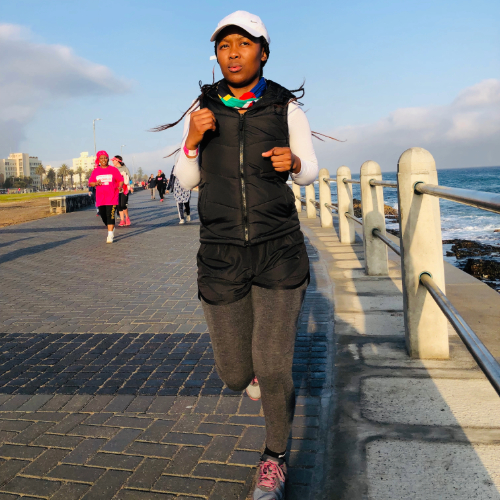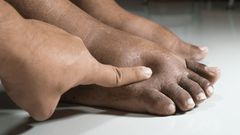Many of us have moments that force us to re-examine our lifestyles—whether it’s a decision to start exercising, reduce screen time before bed, or overhaul our diet. For Mamosa Ngcala, her health journey wasn’t prompted by a passing trend but by a powerful wake-up call. Ngcala, who began her PhD studies in Cape Town before continuing in Germany, shares her wellness transformation—a story that resonates across Africa, especially with Nigerians and Ghanaians juggling work, studies, and family.
Back in 2019, Ngcala moved to Cape Town to commence her doctoral studies at the University of Cape Town (UCT). Like many young professionals who relocate for education or career moves in Lagos, Abuja, Accra, or Johannesburg, her transition was layered with excitement and anxiety. Eventually, she would enroll in a joint PhD program between UCT and Germany’s University of Potsdam, opening new doors but also introducing unexpected challenges common to many international students.
Struggles with adapting to new cultures—something many Nigerians also experience when moving within or outside the country—compounded her stress. According to Ngcala, “I didn’t secure campus accommodation ahead of time, so I had to hustle for a spot when I got there.” Like many young adults living away from home for the first time, her diet was mostly what was familiar and easy, regardless of nutritional value. “White pap wasn’t a problem for me; it’s what I grew up eating. Being naturally slim, I didn’t see the need to work out or pay much attention to what I was eating.” It’s a scenario relatable to countless students and young professionals across West Africa, where high-carb staples fill bellies but often lack fibre and nutrients.
The Health Wake-Up Call
However, not long after she settled into her new routine, signs of trouble began to emerge. According to her, “A quick trip to the bathroom began to stretch into a lengthy, uncomfortable process—sometimes lasting more than an hour.” Initially, she dismissed the symptoms as mere constipation, a minor issue. But as the problem persisted, the discomfort escalated. A doctor’s consultation revealed the culprit: hemorrhoids, commonly known as piles—an ailment that affects millions globally, particularly those with sedentary lifestyles and low-fibre diets, as reported by the World Health Organization.
Like many who face health crises, Ngcala’s first attempt at a solution was medication from the pharmacy. “I was hoping for a quick fix,” she admits. But when over-the-counter remedies didn’t work, and she read about surgical options, fear set in. Facing the possibility of surgery motivated her to take a fresh look at her lifestyle.
How Wellness Worked
Determined to avoid going under the knife, Ngcala began to research and overhaul her daily habits—a familiar step for many Nigerians turning to both traditional advice and digital resources for health improvements. She swapped out processed snacks and bulk carbs for fibre-rich foods like vegetables, fruits, whole grains, and oats, all accessible in Nigerian markets. “I stopped eating things like white pap and transitioned to brown rice and even tried polenta as an alternative,” she notes. For breakfast, she relied on fibre-packed choices such as oats and bran cereals, while also making it a rule to drink warm water first thing in the morning and stay hydrated all day.
But nutrition wasn’t the only change. Movement became non-negotiable. Ngcala incorporated daily walks, at-home workouts, and eventually, running—to manage stress and support digestion. Within a week, she began noticing improvements. “My bathroom visits returned to normal, and my body responded positively. All it needed was some care.” Stories like hers echo across Lagos and Accra, where city dwellers increasingly swap okada rides for walking or join the growing number of runners along Lekki-Ikoyi Bridge or Achimota Park.
A New Cadence – For All Seasons

The health scare proved to be a major turning point. In her own words, “That experience prepared me for the most demanding phase of my academic career—the actual grind of the PhD program.” From late-night writing sessions to countless deadlines, maintaining wellness habits provided Ngcala with the clarity and stamina she needed to thrive, not just survive. In the context of Nigeria’s intense educational atmosphere—where students prepare for WAEC and JAMB or university workloads—her story is a reminder that peak performance hinges on discipline, balanced nutrition, and self-care routines.
Beyond food and exercise, Ngcala credits her mental and emotional stability to intentional routines. One mode of self-improvement that resonated with her—and with many ambitious Nigerians—is the concept from Robin Sharma’s book, The 5 AM Club. The idea: start each day focusing on self-development—whether it’s prayer, physical movement, or reading—before the world’s noise sets in. For Ngcala, carving out this quiet hour made her more present and productive, a habit which “became my anchor, no matter how busy life got.” For many Nigerians who combine work, side hustles, and family life, the power of a strong morning routine can be transformative.
How Wellness Paid Off
The impact of prioritizing wellness was profound. Not only did Ngcala complete her PhD—a feat that tests mental and physical limits—but her dissertation was honoured with the esteemed “magna cum laude” title at the University of Potsdam. “What began as a painful lesson became the foundation for my achievements,” she reflects. Wellness proved crucial not just in academic success but in shaping new ambitions. In an inspiring twist, she morphed into a marathon runner, finishing a full 42.2 km race—an achievement that felt far out of reach just a few years earlier. The trend of running and fitness challenges is also growing rapidly in Nigeria and Ghana, as both men and women discover the joy of movement for health and community.
Lessons from a Health Wake-Up Call: What Nigerians and Africans Can Learn
Ngcala’s journey is a powerful message for African women—and all Africans. According to her, “Your body is always giving you signals. Learn to listen and respond.” Pain is not just something to suppress, especially in cultures where pushing through discomfort is often celebrated. Experts like Dr. Ngozi Enekwizu, a Lagos-based nutritionist, agree that “Nigerians often ignore early symptoms, only seeking help when issues escalate. Taking preventive action can make a significant difference.”
Ngcala urges women—and by extension, anyone striving in high-pressure environments—to pay attention early. “Your well-being isn’t something you earn after working hard. It’s what sustains you while you pursue your dreams. Whether you’re hustling in Lagos, building a business in Abuja, navigating family pressures in Accra, or grinding through university, start with small, manageable steps. Drink more water, choose nourishing foods, move when you can, protect your sleep, and learn to say ‘no’ when your body is calling for rest.”
- Hydration: Carry a reusable water bottle and set reminders to drink regularly—especially under the hot West African sun.
- Smart food swaps: Try brown rice, unripe plantain, or yam with fibre-rich vegetables instead of only white rice or pap.
- Accessible movement: Take the stairs, dance with friends, walk to nearby markets—movement doesn’t always require a gym membership.
- Sleep routines: Set boundaries for screen time and avoid caffeine late in the day to promote restful sleep.
- Mental well-being: Try a morning devotion, short breathing exercises, or journaling before the day’s demands begin.
Local health statistics support her experience. According to Nigeria’s Federal Ministry of Health, non-communicable diseases like hypertension, diabetes, and complications from lifestyle-related habits are on the rise. Experts note that many of these conditions are preventable when the right habits are adopted early—and stories like Ngcala’s can inspire a culture of prevention rather than reaction.
What’s the lesson? Small, intentional changes compound over time. You don’t have to wait for a serious scare or painful symptom before pursuing a healthier way to live. People across Africa are reclaiming their wellness. As more success stories like Ngcala’s surface, both within and beyond Nigeria and Ghana, a new narrative emerges—one where wellness is both accessible and empowering for everyone.
What steps have you taken to prioritize your own wellness—and what challenges have you faced in balancing healthy habits with daily life in Nigeria or West Africa? Share your thoughts in the comments and help us build a supportive community of wellness warriors!
Have a powerful story about your health, fitness journey, or a transformation that could inspire others? We’d love to hear from you! Reach out and get your story featured or discuss story sales by emailing story@nowahalazone.com.
For support or general inquiries, contact us at support@nowahalazone.com.
Stay connected and be the first to hear inspiring local stories by following us on Facebook, X (Twitter), and Instagram.










